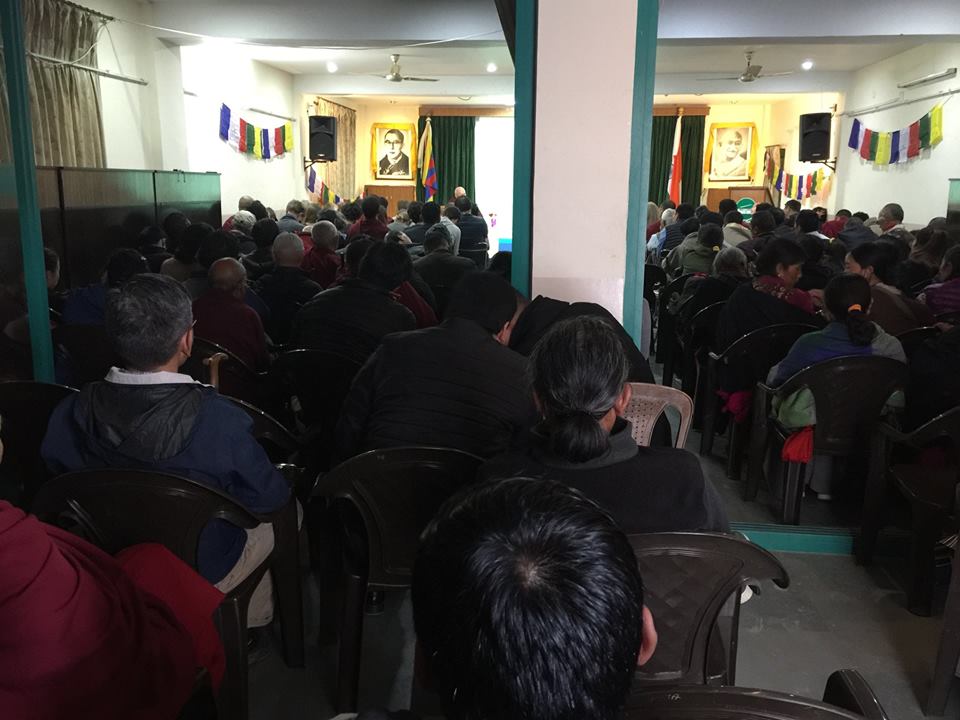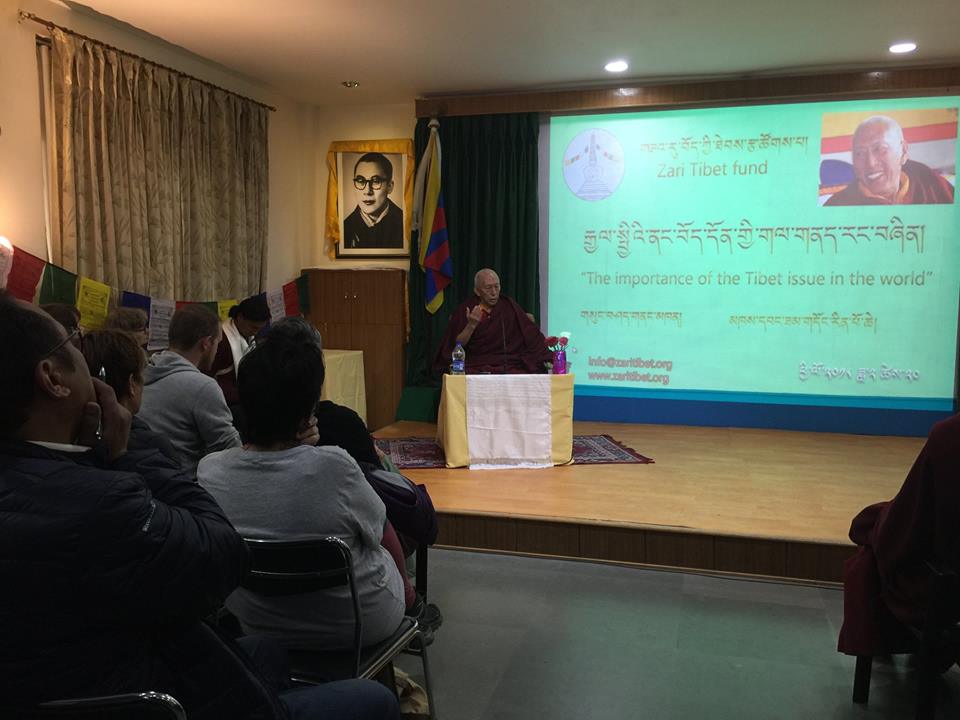Address on the theme of “The Importance of the Tibet issue in the world”
In the afternoon of 20 February 2018 His Eminence Prof. Samdhong Rinpoche gave a guidance address on the theme of “The Importance of the Tibet issue in the world.” Requested and organised by England-based Zari Tibet Fund, and convened at the Library of Tibetan Works and Archives, Dharamshala, the address was attended by over a hundred people of various nationalities, ordained and lay, and groups of pilgrims from Tibet.
His Eminence Rinpoche pointed out the importance of recognising clearly the Tibet issue: When we first arrived into exile in 1959 people abroad did not know clearly the Tibet issue (Tibet situation). Along with that the People’s Republic of China launched rigorously extensive propaganda, calling us all reactionaries, rightists, antagonists against Marxist-Leninist socialism, resulting in many thinking that we were revolting against communism and the dogmas of socialism, and that the Tibetans could not keep staying in Tibet because they could not accept them—as such, there were many who considered it was a clash of political principles.
Yet, if viewed solely from socialist and economic systems there is nothing that we cannot accept, nor that is unworthy to accept, as regards Marxism. His Holiness the Dalai Lama time and again says that in terms of the situations of the society and economy, His Holiness is a Marxist. Anyway, when looked at the ultimate goal of Marxist socialism, and its nature, it professes the need for equal economic income for all citizens, and when the society ultimately arrives at socialism all persons should strive, according to individual ability, towards society’s production, and so on, which are not in discord with Buddhist teachings, and that we do not need to revolt against them. As such, it is important that we need to know it clearly that the Tibet issue was not based on conflict of political principles.
Another disinformation propagated by the Chinese was that Tibet’s hereditary aristocracy and more so that the political powers of the successive His Holiness the Dalai Lamas had come from feudalism, and to topple that and to give the power of the public to the public did not satisfy the Tibetans, who then revolted—thus the Chinese described the Tibet issue as a struggle for political powers. But it is very clear that, that was not so. Prior to taking on the political responsibilities, already from the age of 13 – 14 His Holiness the Dalai Lama had thought of and put efforts for the need to make changes to the Tibetan political situation, to transform it into a modern democratic system, with a constitution. The evidence for that was, immediately after assuming political responsibilities the first work His Holiness carried out was the establishment of “Reform Office”; there had been problems from the part of those who worked in there not comprehending exactly the thoughts of His Holiness.
When His Holiness the Dalai Lama assumed political responsibilities the regions beyond Chamdo—about half of Tibet—had been lost under communist China. Not long thereafter the entire Tibet was lost to China, under the “17-point Agreement,” thus the reform works were not successful.
Also, some were of the opinion that since Tibetans have in their mind a strong view of regional ethnicity (regional nationalism), and the Chinese occupiers have in their mind a strong view of a ‘great race,’ so it was an issue resulting from a racial struggle—this opinion too is wrong.
Our issue is this: There is a specific duty incumbent on Tibetans as a race. That duty is to be accomplished through Tibetan spirituality, Tibetan culture, Tibetan language, through those three. When adverse factors occurred against that [duty], the resulting situation was that the Tibetan populace did not accept the adversaries, the adverse factors. As regards that, one thing that we need to know clearly is that, we are not struggling for rights, we are saying that the situation regarding our duty is not right. Our issue is what the present People’s Republic of China does—politically, economically and by law—in its occupation of Tibet is not right, that they create adverse factors for our carrying of duties towards humanity in general.
Indicated through the promulgation of the Middle Way Policy by His Holiness the Dalai Lama are, that the Tibet issue is not a racial conflict, nor a struggle for powers, not a clash of political principles—all these have been shown clearly by the Middle Way Policy. If one looks through that it could become clear as regards the nature of our issue.
 The conflict is of between truth and falsity, of between just and the unjust, that is, a conflict through a situation of worthy (wos pa) and unworthiness (mi wos pa). Unlike other conflicts (contradictions), therefore, there is nothing that cannot be resolved with that conflict. If there is understanding and consideration from both sides the conflict between us two (Tibet and China) that is to be resolved is nothing deep and extensive. Provided that there are no adverse factors for all Tibetans to accomplish the universal duty incumbent towards the world, and provided all internal freedoms for accomplishing that, then we are not saying that we want political powers, we are not saying that we want the rights as a race. At any rate, we need to produce the opportunity (state) to sustain as how we Tibetans are formed, and for that it is not right to create adverse factors by People’s Republic of China’s political rule, military oppression, and force—that is the goal and the main objective of what we are saying. If one knows that clearly one would be able to know clearly the Tibet issue.
The conflict is of between truth and falsity, of between just and the unjust, that is, a conflict through a situation of worthy (wos pa) and unworthiness (mi wos pa). Unlike other conflicts (contradictions), therefore, there is nothing that cannot be resolved with that conflict. If there is understanding and consideration from both sides the conflict between us two (Tibet and China) that is to be resolved is nothing deep and extensive. Provided that there are no adverse factors for all Tibetans to accomplish the universal duty incumbent towards the world, and provided all internal freedoms for accomplishing that, then we are not saying that we want political powers, we are not saying that we want the rights as a race. At any rate, we need to produce the opportunity (state) to sustain as how we Tibetans are formed, and for that it is not right to create adverse factors by People’s Republic of China’s political rule, military oppression, and force—that is the goal and the main objective of what we are saying. If one knows that clearly one would be able to know clearly the Tibet issue.
As regards the importance, internationally, of the Tibet issue, His Eminence Rinpoche said:
Since it is solely in Tibetan Buddhism that the entirety and without mistakes the teachings of the Buddha and the commentarial works of the subsequent adepts are present, so through Buddhism the Tibet issue has become important. The geographical location of Tibet is world’s third pole, and as widely known, Tibet is the source of eight major rivers of Asia, thus the lives of a large population of Asia are related with the rivers of the Tibetan plateau, and as such the Tibet issue has become important internationally.
Likewise, politically too, the Tibet issue is related with the stability of the world and of Asia. The stability of Asia is related with the stability of India and China, and for the stability of India vis-à-vis China mutually, the Tibet issue has become greatly important. Prior to China occupying Tibet’s territory in the mid-last century there was no conflict between India and China, it was subsequent to annexation of Tibet by China there emerged the issue and problem of border demarcations, and the continuing problem of Tsangpo (Brahmaputra) and so forth.
Also, in terms of non-violent struggle, these days in the world there are violence of wars, violence of terrorism and so on, and due to a variety of violence there are severe many problems. Notwithstanding that there are many who merely speak of non-violence and peace, it is the Tibetans who are in actuality who practise non-violence and the path of peace, and in terms of that as well the Tibet issue has become important internationally.
